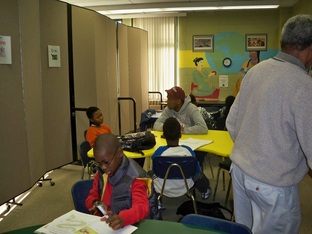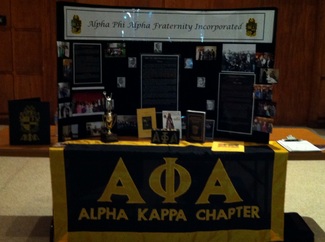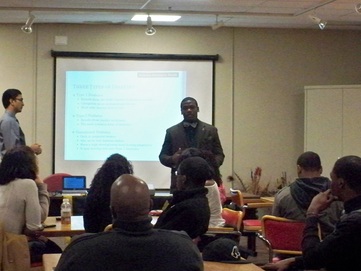National Programs
The Onward and Upward Movement continues through the diligent dedication to national strivings of the brothers of Alpha Phi Alpha Fraternity, Inc. Alpha Kappa Chapter, alongside other chapters of Alpha nationwide, are involved in Go-to-High-School, Go-to-College, A Voteless People Is A Hopeless People, My Brothers Keeper, and Project Alpha. Our chapter’s primary goals in executing these programs is to reach out to Western Massachusetts, promising influential youth, and the Pioneer Valley communities.
"Go-to-High School, Go-to-College"

"Go-to-High School, Go-to-College" program, established in 1922, concentrates on the importance of completing secondary and collegiate education as a road to advancement. Present research places great value in postsecondary education. School completion heavily impacts the success of young African-American men and is the single best predictor of future economic success. Through the Go-to-High-School, Go-to-College educational initiative, young men receive information and learn strategies that facilitate success. Alpha men provide youth participants with excellent role models to emulate.
During the 9th Alpha Phi Alpha General Convention, held at Virginia Union University in 1916, General President H.H. Long emphasized the need for the fraternity to stress the importance of education. By 1920, the Fraternity had ignited a commission that consisted of five Alumni Brothers who, in turn, launched a movement toward influencing African-Americans around the country to “go to high school and to college.” This was the active beginning of the “Go-To-High-School, Go-To-College” movement.
The purpose of this initiative was to touch as many high schools and communities as possible by personal contact or through the distribution of educational pamphlets. With Brother Roscoe C. Giles at the reigns, the commission directed that the first week in June 1920 be set aside for all chapters to implement the "Go-To-High-School, Go-To-College" educational campaign. Aiding the movement, Alpha President L.L. McGee distributed letters urging each chapter to be committed to the movement stating, “In this effort we must not shoot in the air but accomplish results. No feeble effort will be effective, but each chapter must perform its part of the program with interest and drive. In 1989, under the guidance of Brother LeRoy Lowery III, the “Go-To-High-School, Go-To-College” movement was formally restructured. At the 83rd General Convention in San Antonio, Texas, “Go-To-High-School, Go-To-College” was formally voted a National Program of the Fraternity and became mandatory for each chapter to implement.
It was suggested by Brother Lowery that the participants of the "Go-To-High-School, Go-To-College" program be male African-American 7th to 12th graders. In addition, the suggested activities of the program were African and African-American history, field trips, entrepreneurship, athletic activities, tutoring, practical life lessons, community service projects, financial affairs, current events, proper student work habits, workplace visits, career orientation, health and hygiene, goal setting and fraternalism.
During the 9th Alpha Phi Alpha General Convention, held at Virginia Union University in 1916, General President H.H. Long emphasized the need for the fraternity to stress the importance of education. By 1920, the Fraternity had ignited a commission that consisted of five Alumni Brothers who, in turn, launched a movement toward influencing African-Americans around the country to “go to high school and to college.” This was the active beginning of the “Go-To-High-School, Go-To-College” movement.
The purpose of this initiative was to touch as many high schools and communities as possible by personal contact or through the distribution of educational pamphlets. With Brother Roscoe C. Giles at the reigns, the commission directed that the first week in June 1920 be set aside for all chapters to implement the "Go-To-High-School, Go-To-College" educational campaign. Aiding the movement, Alpha President L.L. McGee distributed letters urging each chapter to be committed to the movement stating, “In this effort we must not shoot in the air but accomplish results. No feeble effort will be effective, but each chapter must perform its part of the program with interest and drive. In 1989, under the guidance of Brother LeRoy Lowery III, the “Go-To-High-School, Go-To-College” movement was formally restructured. At the 83rd General Convention in San Antonio, Texas, “Go-To-High-School, Go-To-College” was formally voted a National Program of the Fraternity and became mandatory for each chapter to implement.
It was suggested by Brother Lowery that the participants of the "Go-To-High-School, Go-To-College" program be male African-American 7th to 12th graders. In addition, the suggested activities of the program were African and African-American history, field trips, entrepreneurship, athletic activities, tutoring, practical life lessons, community service projects, financial affairs, current events, proper student work habits, workplace visits, career orientation, health and hygiene, goal setting and fraternalism.
"A Voteless People Is A Hopeless People"

"A Voteless People is a Hopeless People" was initiated as a National Program of Alpha during the 1930's when many African-Americans had the right to vote but were prevented from voting because of poll taxes, threats of reprisal, and lack of education about the voting process. Voter education and registration has remained a dominant focus of this outreach activity for over 65 years. In the 1990's, the focus shifted to include political awareness and empowerment, delivered prominently through town meetings and candidate forums.
The origin of Voteless People is a Hopeless People program reach back to 1932, when the Education for Citizenship program was created. It consisted of a board of seven Brothers with its chairman serving as the Director of Education. The Education for Citizenship movement emphasized: vocational needs and job placement; qualification and participation in voting; establishment and support of race businesses and enterprises; improvement of health conditions; promotion of wealth conservation; the combating of the doctrine of racial inferiority and the support of all efforts vital to the improvement of black welfare.
Throughout the 1930s, chapters were conducting programs which were designed to translate the ideals of the Fraternity into action. There were mass meetings, radio talks, plays and pageants, displays of placards, and the tagging of individuals. The tags bore the slogan, "A Voteless People Is A Hopeless People." In the 1940s and 1950s, Brothers worked vigorously in voting campaigns and for the abolishment of the poll tax. Today, Alpha Phi Alpha Fraternity’s voter registration efforts throughout the years have increased the voting strength of African-Americans. Because of the continued political attacks on African-Americans, we have continued our aggressive efforts in getting our voter campaigns into our communities.
The origin of Voteless People is a Hopeless People program reach back to 1932, when the Education for Citizenship program was created. It consisted of a board of seven Brothers with its chairman serving as the Director of Education. The Education for Citizenship movement emphasized: vocational needs and job placement; qualification and participation in voting; establishment and support of race businesses and enterprises; improvement of health conditions; promotion of wealth conservation; the combating of the doctrine of racial inferiority and the support of all efforts vital to the improvement of black welfare.
Throughout the 1930s, chapters were conducting programs which were designed to translate the ideals of the Fraternity into action. There were mass meetings, radio talks, plays and pageants, displays of placards, and the tagging of individuals. The tags bore the slogan, "A Voteless People Is A Hopeless People." In the 1940s and 1950s, Brothers worked vigorously in voting campaigns and for the abolishment of the poll tax. Today, Alpha Phi Alpha Fraternity’s voter registration efforts throughout the years have increased the voting strength of African-Americans. Because of the continued political attacks on African-Americans, we have continued our aggressive efforts in getting our voter campaigns into our communities.
"Project Alpha"

For more than 20 years, the men of Alpha Phi Alpha have been working with the staff and volunteers of the March of Dimes Birth Defects Foundation to take Project Alpha to hundreds of communities and thousands of teen males. Alpha Phi Alpha Fraternity, Inc. and the March of Dimes Birth Defects Foundation began the formal and collaborative implementation of Project Alpha in 1980. This project is designed to provide education, motivation and skill-building on issues of responsibility, relationships, teen pregnancy and sexually transmitted diseases for young males ages 12-15 years. Designed to provide young men with current and accurate information about teen pregnancy prevention, Project Alpha consists of a series of workshops and informational sessions conducted by Alpha Phi Alpha Fraternity brothers. The three goals of Project Alpha programs are:
Project Alpha week, which started in 2000, targets the second week of October every year. Alpha Phi Alpha Fraternity, Inc. chapters all across the country execute the program in concert with their local March of Dimes affiliate.
PROGRAM HIGHLIGHTS
- Sharing Knowledge by combating ignorance and fear with factual information.
- Changing Attitudes by providing motivation toward positive changes in sexual behavior.
- Providing Skills by creating a sense of empowerment and self-esteem.
Project Alpha week, which started in 2000, targets the second week of October every year. Alpha Phi Alpha Fraternity, Inc. chapters all across the country execute the program in concert with their local March of Dimes affiliate.
PROGRAM HIGHLIGHTS
- Provides education for young males 12-15 years old on sexuality, fatherhood and the role of males in relationships.
- Motivates young men to make decisions about their goals and values, and act in ways that support their decisions.
- Builds young men's skills through role-playing while utilizing appropriate male role models and mentors.